Dental Crowns: Types, Costs and Benefits
Dental crowns, also called tooth crowns or tooth caps, helps to fix and protect damaged teeth. In this blog, we’ll look at the different types of dental crowns and their costs. We’ll also give you some tips to help you decide what’s best for your teeth.
What Are Dental Crowns?
Dental crowns are fake teeth shaped in the form of caps, that are placed over a damaged or decayed tooth to cover them. They help restore the tooth’s shape, size, and function. They are also quite famous for replacing missing teeth, as dentists use them to cover up dental implants and root canal treatments. Dental crowns generally can make your teeth look better, your smile more straight and attractive, and also boost your confidence.
When do you know you need dental crowns?
Dental crowns have many uses that serve different purposes. You may think of getting a dental crown if you want to;
- Generally want a better and more straight smile
- Replace missing teeth
- Cover root canal-treated tooth
- Cover a dental implant
- Cover discolored or severely stained teeth
- Hold a dental bridge
- Protect and or support a cracked tooth
- Strengthen weak tooth
Types of Dental Crowns
Porcelain Crowns
-
- Looks: They are thinly shaved crowns made from Ceramic or Porcelain itself. These crowns are also very popular for their natural appearance and how they almost match the color of natural teeth. This makes them perfect for replacing the front teeth. Further more, they are the perfect choice for people who have metal allergies and cant have metal crowns.
- Strength: Porcelain crowns, although they look very aesthetically pleasing, they are not very strong and can chip or break if not taken care of properly. This is because they are thinly shaved to resemble natural teeth enamel. Thus, they sacrifice strength for aesthetics.
- Cost: £180 – £600 per tooth in turkey.
Advantages of getting Porcelain Crowns
- Aesthetic Appearance: The main advantage of getting porcelain crowns is the fact that they are charming in the eyes and look very natural.
- Biocompatible: Porcelain crowns are very biocompatible meaning reduced risk of allergic reactions or sensitivity.
- Fairly Priced: In countries like Turkey, for example, the price of Porcelain crowns is mostly very low, when compared to other crowns, making people go for Porcelain crowns instead.
Disadvantages of Porcelain Crowns
- Durability: They can easily crack, chip, or break because they are shaved very thin to make them look more aesthetically beautiful.
- Expensive in other countries
- They can not be used for dental bridges
Metal Crowns
-
- Looks: Metal Crowns are dental crowns made from either gold, platinum, or base metal alloys. Their strong metallic looks make them very noticeable and this makes people shy away from them, as they are not very aesthetically pleasant.
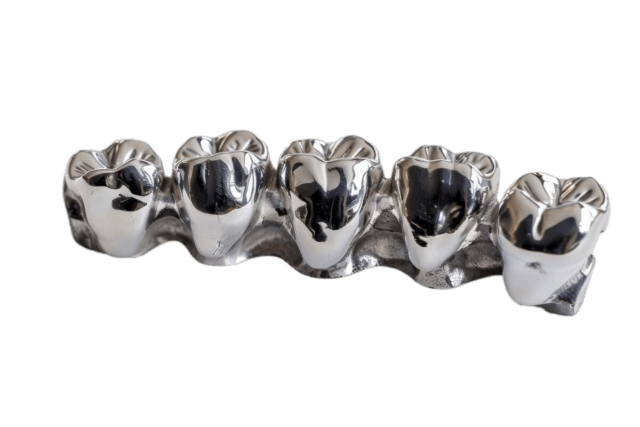
- Strength: Very strong and lasts very long.
- Cost: Depending on the type of metal being used, prices can range from £150 – £1,500 per tooth in Turkiye
- Looks: Metal Crowns are dental crowns made from either gold, platinum, or base metal alloys. Their strong metallic looks make them very noticeable and this makes people shy away from them, as they are not very aesthetically pleasant.
Advantages of Getting Metal Crowns
- They are extremely strong and durable. This makes them the best choice for molars.
- They are the least type of crown to break or chip or wear down over time
- Metal crowns require very little of your tooth to be shaved.
Disadvantages of Metal Crowns
- They are known for having a bad smell after some time.
- Some people may suffer from tooth sensitivity after getting metal crowns
- They are less aesthetic as the metallic color makes them less suitable for visible teeth
- Based on the metal that is used, the cost can be considered expensive. Like gold for example which is from around £800 for a single tooth.
- Food particles usually get into spaces that the crown creates.
-
Porcelain-Fused-to-Metal Crowns (PFM)
-
- Appearance: PFM are crowns made with Porcelain on the outside with a metal base (Metal on the inside). They combine how durable metal is, and the aesthetic properties of Porcelain to provide a balance between strenght and aesthetics.
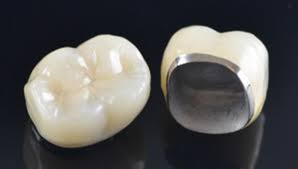
- Strength: Stronger than all-porcelain crowns but can still chip.
- Cost: £200 – £1,500 per tooth in Turkiye.
Zirconia Crowns
-
- Looks: Zirconium crowns are dental crowns with perfect balance between strength and aesthetics. They blend perfectly with your natural teeth and are very much less likely to break. They are also used for both the front and back teeth. You can achieve a hollywood smile with these crowns.
- Looks: Zirconium crowns are dental crowns with perfect balance between strength and aesthetics. They blend perfectly with your natural teeth and are very much less likely to break. They are also used for both the front and back teeth. You can achieve a hollywood smile with these crowns.
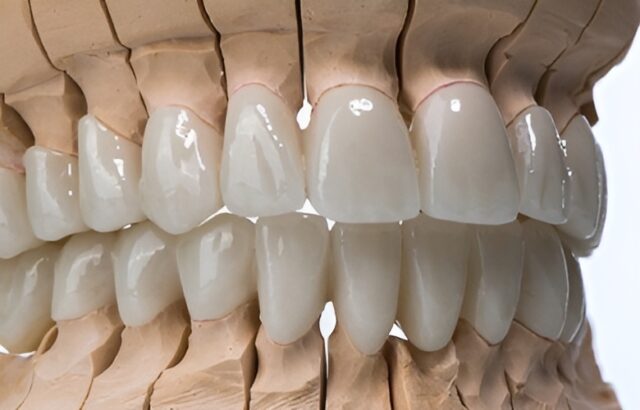
-
- Strength: Extremely strong and long-lasting and does not easily break or chip .
- Cost: £200 – $1000 per tooth in Turkey.
Advantages of getting Zirconium Crowns
- Perfect for replacing missing or chipped tooth
- Best crown for dental implants
- The best choice for dental bridges
- They are biocompatible, meaning they are safe for everyone
- Last a lifetime
- They dont produce any smell
- The color does not change
Disadvantages of Zirconium Crowns
- Firstly, some clinics charge very high for this crown (Up to £2500 for example), depending on where you are.
- Also, you will need to have a significant portion of your natural teeth shaved down.. This makes many people have second thoughts about getting Zirconia crowns.
Resin Crowns
-
- Looks: These dental crowns made from Resin materials match your teeth but are not as natural-looking as others.
Factors Affecting The Cost Of
Dental Crowns
- Material: The type of material used to create the crown significantly affects the price. High-quality materials like porcelain and zirconia cost more.
- Location: Prices vary depending on the country and city and also the clinic where you will be getting treatment from.
- Complexity: More complex procedures cost more. This is because more complicated procedures will require more time and expertise.
- Dentist’s Experience: Experienced dentists may charge more.
Cost of Dental Crowns in Different Countries
- USA: $800 – $3,000
- Canada: $700 – $2,500
- UK: £400 – £1,200
- Hungary: €300 – €800
- Turkey: $200 – $600
- Thailand: $250 – $700
- Germany: €600 – €1,500
Types of Dental Crowns Preparation Method
Initial Consultation
- The dentist will examine and prepare the tooth.
Tooth Shaping
- Your Dentist will then reshape the tooth to fit the crown.
Impressions
- The Dentist will later takes an impression of the tooth. You will bite down on a material, and from your bite, the crowns will be made to show how your teeth should be shaped.
Temporary Crown
- Some clinics or countries place a temporary crown until a permanent one is prepared..
Crown Placement
- Finally, the permanent crown is fitted and adjusted in your mouth and your smile is restored.
Practical Tips for Maintaining Your Dental Crowns
- Good Oral Hygiene: Brush twice daily and floss regularly.
- Avoid Hard Foods: Don’t chew on ice or hard candies.
- Regular Dental Check-Ups: Visit your dentist every six months if possible.
- Use a Mouthguard: Use a mouthguard if you grind your teeth at night.
Advantages of Dental Crowns
- Restores Tooth Function: Helps you chew and bite better.
- Improves Appearance: Makes your teeth look nicer.
- Durable: Can last many years with proper care.
- Protection: Shields weak or damaged teeth from more harm.
Disadvantages of Dental Crowns
- Cost: Dental crowns can be pricey depending on your location, the procedure required, and the clinic offering this service.
- Sensitivity: Some people may feel tooth sensitivity after getting a crown.
- Maintenance: Dental crowns may need regular dental visits to stay in good shape.
Frequently Asked Questions About Dental Crowns
- What is a dental crown?
- A cap placed over a damaged or decayed tooth to restore its shape, size, and function.
- How long do dental crowns last?
- With proper care, they can last between 10 to 15 years.
- Do dental crowns look natural?
- Yes, especially porcelain and zirconia crowns that match the color of your teeth.
- Is the procedure painful?
- You will not feel any pain because local anesthesia is used.
- How much do dental crowns cost?
- Costs vary from $300 to $3,000 depending on the type and location.
- Can dental crowns be whitened?
- No, crowns do not respond to whitening treatments.
- What are the alternatives to dental crowns?
- Alternatives include veneers, inlays, and onlays.
- Does insurance covers dental crowns?
- It depends on the insurance plan and the reason for the crown.
- Can crowns fall off?
- Rarely, but if they do, they can usually be re-cemented.
- How do I care for my dental crown?
- Brush and floss regularly and avoid biting on hard objects.
Conclusion
Knowing about the types of dental crowns and their costs helps you choose the best option for your teeth. Dental crowns can restore function and appearance to damaged teeth. Remember to maintain good oral hygiene, avoid hard foods, and visit your dentist regularly to keep your crowns in top condition. Talk with your dentist to find out which type of dental crown is right for you.

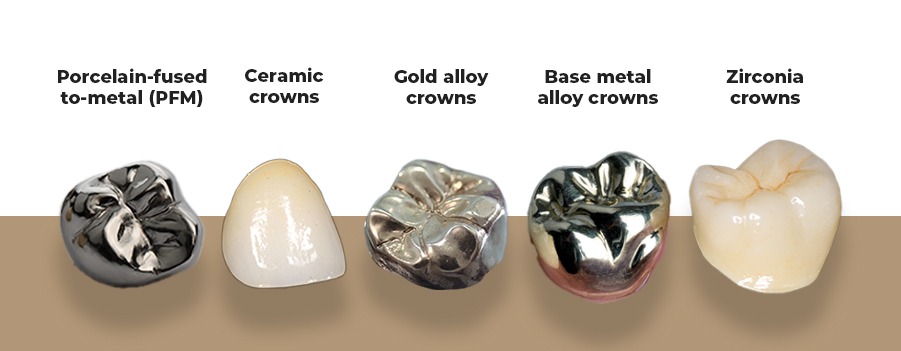
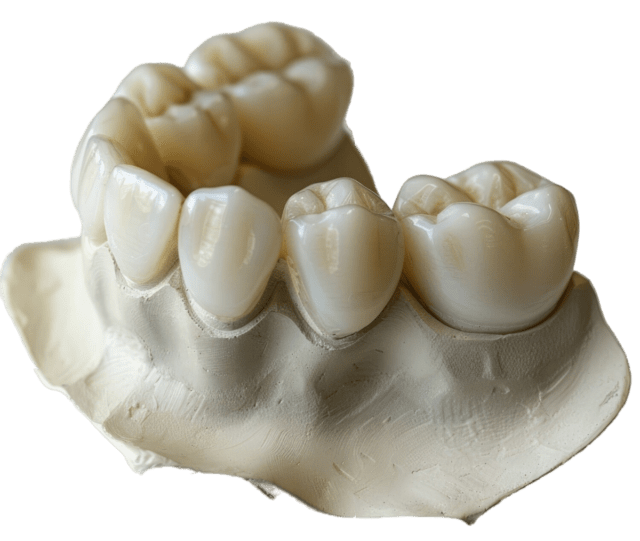
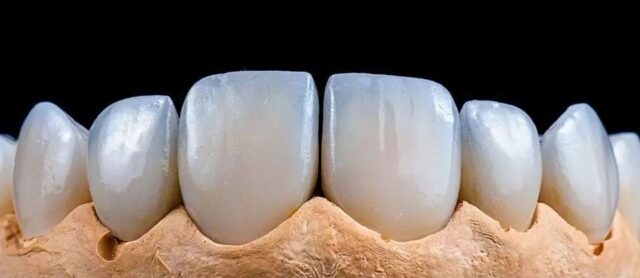
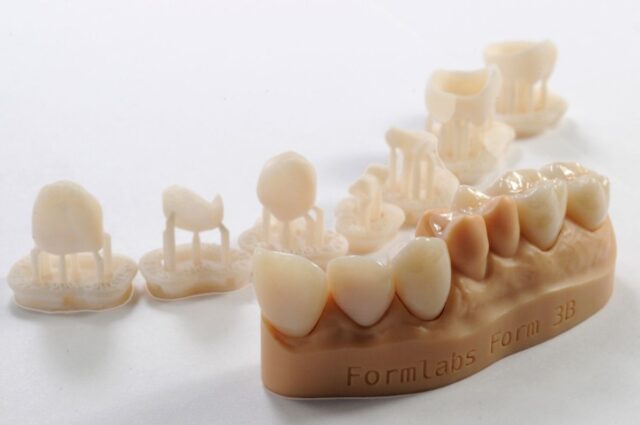

4 comments
emmah johnny
June 12, 2024 at 3:52 pm
This has been extremely helpful
parlaclinic1
August 19, 2024 at 3:31 pm
Thank you for your feedback Mr Emmah. We are happy that the information in this post was of help to you. You can check other posts, they may helpful too.
Leo Olive
September 10, 2024 at 2:02 am
I think this is one of the most significant information for
me. But wanna remark on few general things, The site style is ideal,
the articles is informativce, but i think there are more types of crowns than listed here. Good job, cheers
Anna Brown
September 17, 2024 at 8:05 am
I’m more than happy to find this page. I want to tto thank you for your time for
this particularly fantastic read!! It really helped me. I definitely appreciated
every bit oof it and i also have you book-marked tto look at new stuff on your blog.